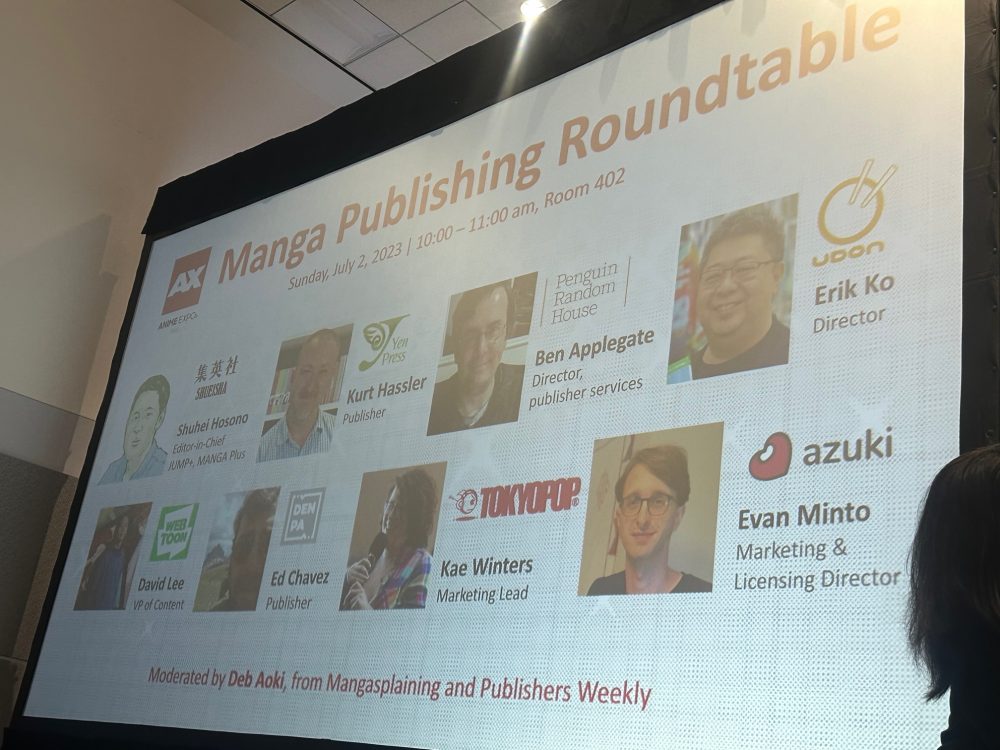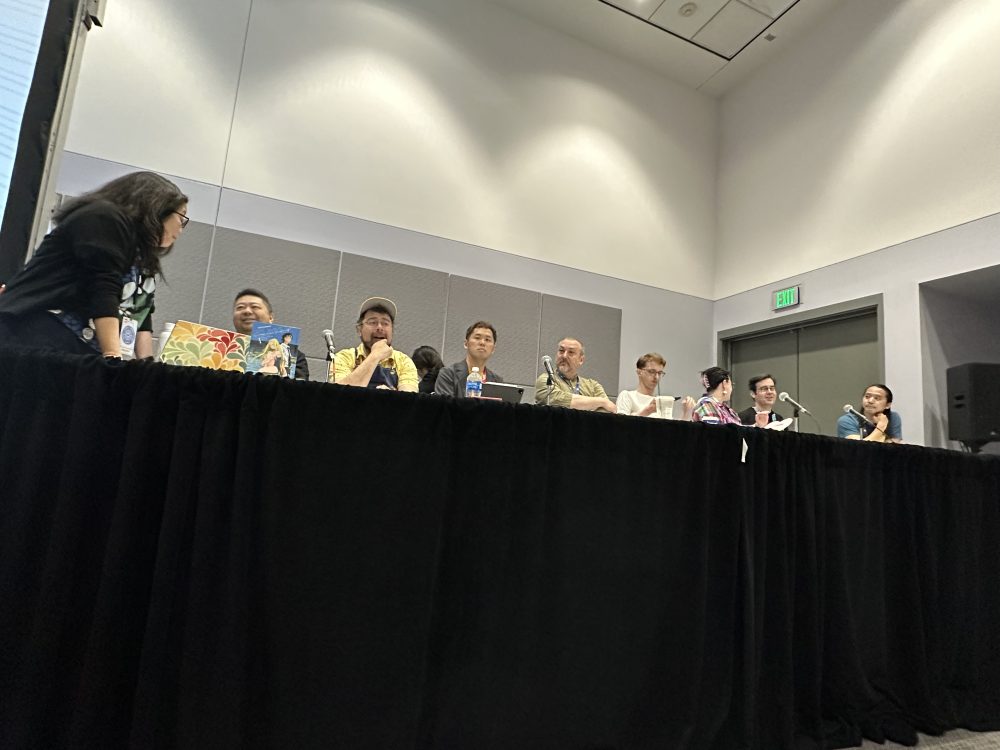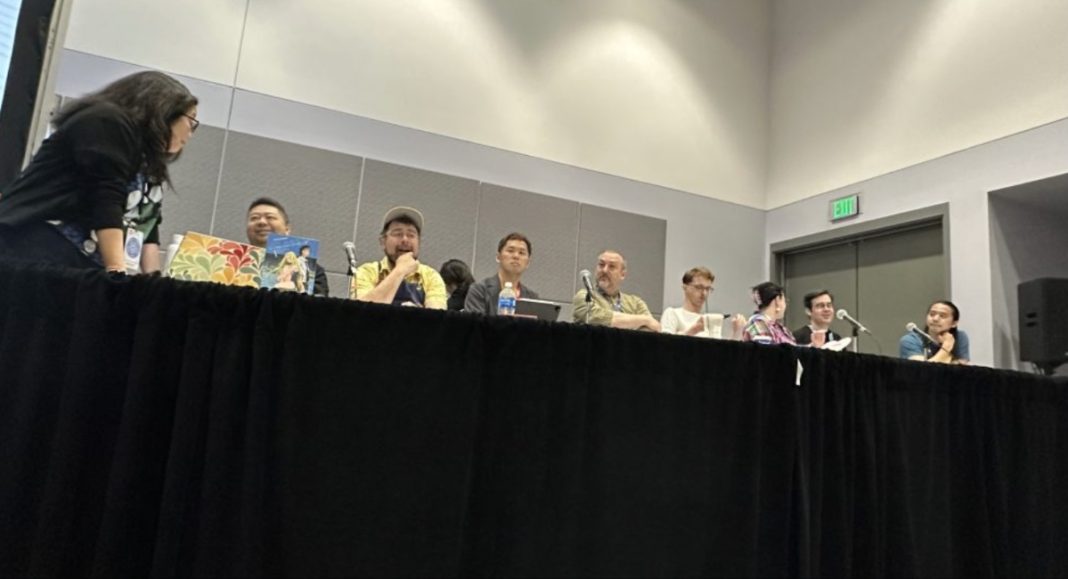On Sunday, July 2, 2023, at Anime Expo, esteemed writer and comics reviewer Deb Aoki hosted a “Manga Publisher’s Roundtable,” with guests from major and independent publishers that publish and distribute print and physical manga (and manhwa!) here in North America. Those guests included:
Shuhei Hosono, Editor in Chief at Shueisha’s Jump+ and MANGAPLUS
Kurt Hassler, Publisher at Yen Press
Ben Applegate, Director/Publisher Services at Penguin Random House (Kodansha USA)
Erik Ko, Founder and Publisher of Udon Entertainment
David Lee, VP of Content at NAVER’s WEBTOON
Ed Chavez, Founder and Publisher at Denpa, LLC
Kae Winters, Marketing Lead at TOKYOPOP
Evan Minto, Marketing and License Director at Azuki

The panel aimed to enlighten manga fans about the state and trajectory of the publishing industry as it pertains to manga and, tangentially, the rise of manhwa. It began with introductions, as well as several manga licensing announcements from Udon, including Ottoman: Henshin Hero Husband, My Stepmom’s Daughter is My Ex, More Than a Married Couple, But Not Lovers, and Falling in Love With a Traveling Cat.
The first topic was a short overview of trends in Japan, thanks to Hosono-san’s insight. Notably, digital manga sales have eclipsed print sales, which have been gradually declining. Ever since the pandemic, however, the industry has only been growing. Many print magazines have been shutting down or moving to digital-only to meet market needs, and there is more interest than ever in Webtoons by Japanese companies. This is something also reflected in the international market.
Trends in North America

Ben: 2020-2022 were good and strong. The 2021 best-selling manga was Attack on Titan Volume 1, bringing in a lot of new readers. Now that backlist trends have leveled, we have newer releases selling more again, meaning that most of those new fans are finally catching up.
Kurt: Retailers were cleaning out shelves, but the point of sales to customers directly hasn’t changed. Retailers were scrambling to fill their shelves but didn’t manage to sell everything, and that’s where the decline in the numbers from last year comes from.
Erik: I agree with retailers; it’s clear that customers are still hunting for print books. Summertime Rendering was actually sold out before a reprint could be sent, so consumers are still collecting.
Ed: Supply chain problems were big until the end of last year. Now, it’s inflation that’s an issue, and for premium books, especially, the price of printing has doubled. For indie publishers like us, growth hasn’t been explosive–because we release less volume, growth just can’t be as big.
Kae: Everyone was going through the same issues with paper shortages, etc., but consumers are consuming from every publisher. Comic shops are starting to stock manga again. TOKYOPOP has been educating those retailers trying to dip their toes. Growth is slowing down, yes, but the demand is definitely still there.
David: The global gross for Webtoon was $1.3 billion in 2022. We’re now working with Penguin for print books (Lore Olympus), and Webtoon Unscrolled has 200,000 volumes sold. People are proving how much they want to read print. With the growth of digital space, eventually the growth of the publishing market is to follow as well. Anime cons have a lot of teens, and younger audiences that continue to join will sustain the market.
Digital Market Growth
Evan: Azuki works directly with consumers. There’s been growth, and especially demographics have expanded, like shoujo and josei.
Deb: The vast majority of the Webtoon audience has been female, primarily reading romance
Hosono: Jump Toon is a Webtoon endeavor. Jump is trying to meet the demand for vertical-scrolling comic consumers. We’re the new challengers in this field so we’ll be trying hard to catch up. As of now, we’re thinking of incorporating a mix of every entry (sublicensing, originals, and adaptations of manga)
David: Webtoons are about accessibility and ease of access. Over the next few years, growth will be explosive for print webtoons, from both original to licensed works.
Kurt: Webtoons are a natural evolution–phones are basically glued to people’s hands 24/7. Rights availability and technical opportunities are a factor for both publishers and artists. It was after the iPad that we saw change in the West. Markets in Korea changed before that due to circumstances (there was a collapse in their print industry in the 2000s). Overseas rights holders weren’t receptive to technology, and suggestions to things like Comixology guided view back when the Western digital comics market began to take shape.
Manga Market Changes in Five Years?
Erik: We will see more diverse content. More people are going to enjoy manga as an entertainment medium, and genres will gradually be blurred.
Hosono: Jump+ debuted in 2014, and the goal so far has been to get firmly into digital publishing. The goal for the next 10 years is to be more globalized. Now more than ever, simulpubs will be better indicative of global hits. In turn, global sales trends will dictate what can be a hit in which country.
Ed: Pop culture, in general, is cyclical. This means that more Japanese or tech companies might come in to get their market share, and diversity might lead to too many fractures that get eventually swallowed up (think: current landscape of streaming services).
Ben: Manga is unquestionably mainstream now; Walmart and Target now stock it. Japan’s aging population means that the reading population is also getting older in their domestic market. This might mean that for sustainability, younger audiences might need to be tapped in from overseas.
Evan: Digital and print will likely be more aligned, but that also could mean that consumers might stay in their bubble and read less of things they already pan over.
David: Diversity is already here. There’s a universal factor that makes something interesting. The goal is really just to make things more accessible to the consumer.
Kae: There will definitely be more titles from Korea and China. People are beginning to ask, “what is manga?” Further acceptance of international content is already blurring lines. People just want good content and are willing to embrace it if it’s being provided to them. (context: TOKYOPOP has been one of the earliest publishers who embraced Korean and international comics alongside manga, as was Yen Press)
Deb: Thank you, Kurt for being around long enough to help shape the North American manga industry and grow it.
Kurt: Manhwa and webtoon demand is HUGE. It’s getting as prolific as manga. There is a plateau coming soon, but that doesn’t mean it won’t be high. Manga is the hot thing, and trends do wane, but demand grows, and the publishers who’ve been here for a while understand the market. Everyone is just guessing and spitballing using their experience, but the consumer decides everything at the end of the day.
After this final comment, the panel ran out of time. As an avid reader of both manga and webtoons, it was incredibly insightful to see these experienced professionals provide their two cents on what is happening in the manga industry post-pandemic. These publishers have countless cult and popular hits, cementing their impact on the Western comics industry. Be sure also to check out Deb Aoki’s work, as she has done immeasurable good in promoting and supporting the niche that manga has carved out here in the West.







